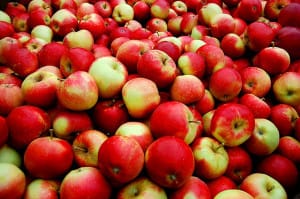Rodale News
by Leah Zerbe
 |
Some food-safety groups warn of potential toxic contamination.
The U.S. Department of Agricluture (USDA) has given the green light for the U.S. to import fresh apples from China, a move that has triggered worry among some food-safety watchdog groups.
“[The USDA’s] approval of imported fresh apples from China could threaten American consumers and apple growers. Thanks to China’s widespread pollution and food-safety problems, we could see apples with dangerous chemical residues imported into the United States,” says Wenonah Hauter, executive director of Food & Water Watch. “A 2014 survey by the Chinese government found that one-fifth of the country’s farmland was polluted with inorganic chemicals and heavy metals including arsenic, cadmium, and nickel.” (Health concerns around these pollutants is huge. The heavy metal cadmium, for instance, is linked to breast cancer and has been shown to trigger accelerated aging.)
According to MyCentralOregon.com, the Food & Drug Administration (FDA) inspects less than 1 percent of imported fruit. All apples imported from China, however, will be required to meet U.S.-approved standards, arrive with a “phytosanitary certificate,” and be declared inspected and free of quarantine pests.
Still, the decision to allow imports from a country plagued with food-safety problems is not a good one, declares Food & Water Watch. “China’s lax food-safety oversight has exposed people in China and worldwide to dangerous foods,” Hauter says. “The Food and Drug Administration is already unable to monitor the growing flood of imported food, and [Thursday’s] approval of even more imports will make it difficult for border inspectors to stop apples and apple products from China with residues of pesticides and contaminants, such as arsenic.”
The decision also opens up threats to domestic apple growers and the environment, opponents of the decision note. Allowing Chinese apple imports could also pose a risk to American apple orchards because the imports could harbor hidden invasive pests, including the destructive oriental fruit fly and other nonnative insects our fruit is vulnerable to, Hauter notes.
According to Hauter, the USDA-approved Chinese apple imports will be in exchange for China opening its market to U.S. fresh apple exports. It’s in China’s hands to make sure these commercially destructive invasive insects would not hitch a ride to America.
The good news is these imported apples feature a sticker that IDs China as the source, so with a little detective work, you can avoid them. But bear in mind, just because an apple is from America doesn’t mean it’s free of contaminants. In fact, Environmental Working Group recently named apples to the #1 spot on its 2015 Dirty Dozen produce list. Nonorganic apples tend to have the most pesticide residues because the chemicals are applied to the crop before and after harvest to preserve the fruit longer. In fact, 99 percent of apple samples tested positive for at least one pesticide residue, so your best choice is organic apples grown in the U.S.

